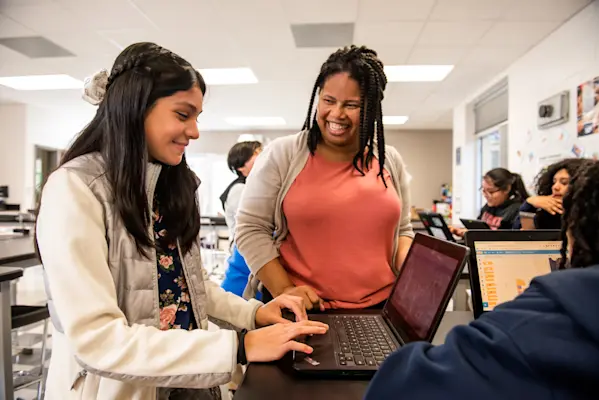Teaching programming (with or without AI)
In 2024, our seminars focused on the newest research into how to best teach programming at school — with and without the use of AI tools. Watch recordings, read our summary blogs, and download speakers' slides.
See upcoming seminars in series
Integrating generative AI with introductory programming (10 December 2024)

Speakers: Leo Porter (UC San Diego) and Daniel Zingaro (University of Toronto)
It's clear that many computing courses will need to change in response to the challenges and opportunities of generative AI. Research on what these changes will look like is ongoing, with some areas of focus better understood than others. For example, the research community has made considerable progress in using generative AI as tutors, but we know much less about generative AI’s impact on student learning and how learning outcomes should change. This seminar will briefly summarise the main areas of ongoing research related to generative AI. Next, it will describe the design goals and findings emerging from the Computing Education Research Laboratory’s work at UC San Diego to create an introductory programming course for majors and non-majors that fully incorporates generative AI into the learning goals of the course. The session will close with a discussion of how faculty can adopt similar courses, areas for innovation, and the next steps for the community.
Leo Porter is a Professor of Computer Science at UC San Diego interested in computer science education research and computer architecture. Leo co-founded the Computing Education Research Laboratory, which is dedicated to better understanding how students learn computing and creating instructional environments where a diverse group of students can succeed.
Daniel Zingaro is an Associate Teaching Professor at University of Toronto. He has taught introductory Python programming to thousands of students over the past 15 years, and has written both no-GenAI and, with Leo Porter, GenAI Python textbooks. Dan has also authored and co-authored textbooks on algorithms and competitive programming, and incorporates as much research-backed instruction as he can!
Performance, workload, emotion, and self-efficacy of novice programmers (12 November 2024)

Speaker: Nicholas Gardella (University of Virginia)
This seminar will explore how artificial intelligence-driven development environments (AIDEs), like GitHub Copilot, impact novice programmers in time-sensitive situations. A within-subjects study was conducted with seventeen participants to examine the effects of using AIDEs on programming performance, workload, emotion, and self-efficacy. The findings revealed that AIDEs significantly enhanced coding efficiency and reduced mental effort, although there were no direct effects on emotion or self-efficacy. However, as participants gained more experience using the AIDE, their performance improved, and their self-efficacy followed. This seminar will discuss the implications of these findings for integrating AIDEs into computer science education, emphasising the importance of practice with AI to build proficiency and confidence.
Nicholas Gardella, MEng, is a PhD candidate in Systems and Information Engineering at the University of Virginia. His dissertation research focuses on understanding human interactions with artificial intelligence-based code generators to inform responsible adoption in computer science education.
Teaching and learning computer science with rapidly evolving generative AI models (8 October 2024)

Speakers: Arto Hellas and Juho Leinonen (Aalto University)
The rapidly evolving landscape of generative AI has already transformed computing education. Educators and researchers are exploring how to best integrate generative AI into their teaching. In this talk, Arto Hellas and Juho Leinonen from Aalto University, Finland, outline their experiences utilising generative AI for a wide variety of teaching tasks, such as exercise generation, responding to student help requests, as well as teaching students how to prompt large language models. Furthermore, they discuss their experiences organising an undergraduate course on software engineering with large language models, where the rapid evolution of the field presents both challenges and opportunities.
Arto Hellas is a Senior University Lecturer at Aalto University. He has been working with software in a variety of roles for a quarter of a century, and his current research focuses on understanding learning in digital and hybrid environments, especially in the context of computer science education. Most recently, he has been exploring the possibilities of large language models in enhancing learning and teaching.
Juho Leinonen is an Academy Research Fellow at Aalto University. He previously worked as a Postdoctoral Researcher at The University of Auckland, Aalto University, and the University of Helsinki, where he earned his PhD in 2019. His research focuses on using educational technology and AI to support and engage learners through learning analytics, generative AI applications, and learnersourcing.
How should we teach debugging to secondary school students? (16 July 2024)

Speaker: Laurie Gale (Raspberry Pi Computing Education Research Centre, University of Cambridge)
Depending on your experiences, you might view the process of bug-fixing as enjoyable, frustrating, both, or something in between. This is no different for school students, particularly while they make the transition from a block-based to a text-based programming language. This seminar will consider some of the cognitive, emotional, and teaching-related challenges that often make debugging (in a text-based programming language) a challenging process for secondary school students to get right. Expect to get some new ideas for teaching debugging, as well as an opportunity to share your own ideas and experiences around the powerful process of bug-fixing.
Laurie Gale is a second-year PhD student at the Raspberry Pi Computing Education Research Centre, supervised by Dr Sue Sentance. He is interested in exploring how to teach programming to primary/secondary school students, with the hope of helping more pupils to enjoy, engage with, and achieve in computing.
Using a feedback literacy approach, what are secondary educators’ views of LLM-generated explanations of program error messages? (11 June 2024)

Speaker: Veronica Cucuiat (Raspberry Pi Foundation)
Decoding cryptic error messages can be a significant obstacle to understanding and progress for anyone new to programming, especially young people. Veronica Cucuiat has been investigating whether large language models (LLMs) could be employed to overcome this barrier.
Veronica has explored expert educators’ views of the explanations of programming error messages provided by LLMs and their suitability for secondary classroom use. In this seminar, she will report on the data gathered from interviews with educators where they used a bespoke code editor prototype to explore the LLM explanations and answered questions on these. She will contextualise educators’ views in feedback literacy theory, and will discuss how such a theory might contribute to teaching and learning of programming using LLMs.
As part of the Raspberry Pi Computing Education Research Centre, Dr Veronica Cucuiat conducts research in the area of computer science education, using varied methodologies to explore how young people learn and engage with digital technologies, as well as the design of meaningful learning experiences. Her background is in computer science, having worked as a software developer and technical leader in the industry. Her PhD was in the area of learning analytics, where she explored ways in which data can be used to evidence the students' construction journeys when creating artefacts using physical computing kits.
Generative AI is changing undergraduate education; and undergraduate research too! (14 May 2024)

Speakers: Stephen MacNeil, Andrew Tran & Irene Hou (Temple University)
The advent of generative AI has triggered transformative shifts in computing education, leaving educators scrambling and students pondering their futures. Amidst this uncertainty, Stephen MacNeil and his team have observed a surge in opportunities for undergraduate involvement in research. Over the past two years, their lab has welcomed over 50 undergraduate researchers, with an impressive 73% of them co-authoring a published paper or poster.
Engaging in generative AI research has proven cathartic for students, empowering the students with agency and the ability to shape their own futures in computing. In contrast to the uncertainty in the classroom, student researchers appear to be more confident and engaged than ever. This talk will include some of experiences and strategies that MacNeil’s team has used to involve undergraduates in computing education research focused on generative AI, while showcasing outstanding projects spearheaded by undergraduate researchers.
Dr Stephen MacNeil is an Assistant Professor in the Department of Computer and Information Sciences at Temple University, Philadelphia, USA, where he directs the Human–Computer Interaction (HCI) Lab. His work in computing education spans inclusive classroom design, scalable undergraduate research ecosystems, and generative AI in education. He has published over 15+ papers on generative AI and hosted multiple related workshops and ‘birds of a feather’ sessions at computing education conferences.
Andrew Tran is an undergraduate student at Temple University studying computer science. Since joining the HCI Lab, he has produced 9 papers and posters about generative AI and computing education. In addition to his role as a researcher, he has participated in software engineering internships at startups and Fortune 500 companies. Andrew has held several leadership roles as President of Temple University's ACM chapter and as the Director of Temple University's annual hackathon, OwlHacks.
Irene Hou is a Research Lead at Temple University's HCI Lab. She graduated from UC San Diego with a BS in cognitive science and a minor in computer science. Her current research focuses on the intersection of generative AI, computing pedagogy, and human–AI interaction. She has received acceptance to PhD programs at UCSD, UCI, and UW, and is set to commence her doctoral studies in the fall of 2024.
Generative AI in programming education: Bridging the gap from school to what lies ahead (16 April 2024)

Speaker: Brett A. Becker (University College Dublin)
Secondary school students and teachers have particular needs and face specific constraints that result in a unique landscape in terms of programming education. The rise of generative AI complicates this scene but also provides several potential opportunities. One of the greatest challenges in this arena is that while university students studying computing have a high likelihood of continuing on a path in computing, most school students choose to go into non-computing disciplines for further/higher education and/or their careers. This talk will focus on how generative AI may be effectively utilised in secondary school programming education and how it can be leveraged so that students can be best prepared for continuing their education or beginning their careers, regardless of discipline.
Dr Brett A. Becker is an Assistant Professor at University College Dublin in the School of Computer Science. His research area is computing education broadly construed, normally focusing on the psychology of programming, programming error messages, novice programmer behaviour, metacognition, and generative AI in education. In 2020, he was awarded a National Forum Teaching & Learning Research Fellowship, Ireland’s most prestigious national award in higher education.
The impact of AI tools on the student experience in programming courses: A preliminary study with an intersectional analysis approach (12 March 2024)

Speakers: Yash Tadimalla and Mary Lou Maher (University of North Carolina at Charlotte)
AI tools like ChatGPT have significant potential benefits for students: they allow students to work constructively on their own schedule and they provide an easy way to ask for help. However, before these tools can be meaningfully introduced into a course, their impact on a student’s ability to learn must be assessed and concerns that they lead to lower competence and poorer programming skills must be addressed.
Yash Tadimalla and Prof. Mary Lou Maher have performed a preliminary study to understand university students’ experiences of learning to program using AI tools. The students were asked to perform a programming task under one of three conditions:
With no external help
With the help of an AI chatbot
With the help of a generative AI tool like GitHub Copilot
The mixed method study also included pre- and post-task assessments and interviews with the students about their experience and perceptions of the tools. The students demonstrated a range of attitudes and behaviours towards the AI tools and these preliminary findings provide insights for future research and plans for incorporating such AI tools into a course.
Yash Tadimalla is a PhD student in the College of Computing and Informatics at UNC Charlotte, where he is pursuing an interdisciplinary degree in Computer Science and Sociology. His research explores how an individual's identity influences their interaction with and learning of technology, particularly in the domains of artificial intelligence and computer science education.
Professor Mary Lou Maher is a professor in the Department of Software and Information Systems at UNC Charlotte, and also directs the Center for Education Innovation and co-directs the Human-Centered Computing Lab. Her research spans integrated cognitive and deep learning models in AI, ethical human–AI interaction, cognitive models of curiosity for education technology, AI-based co-creativity design, and inclusive computer science education.
Can large language models that generate code help K–12 students effectively learn Python programming? (13 February 2024)

Speaker: Majeed Kazemitabaar (University of Toronto)
Large language models (LLMs) can generate Python code from natural language descriptions, which may help students learn to program by reducing frustration and increasing self-efficacy. Majeed Kazemitabaar explores whether this is true by using Codex, a LLM code generator. Majeed asked two groups of students — one with access to Codex and one without — to perform a range of coding tasks that consisted of a code-authoring part and a code-modification part. He found that the Codex students completed more tasks, scored higher, and performed better in unassisted assessments a week later, with no detriment to their performance on the manual code-modification tasks.
Majeed identified four main approaches employed by the students. The ‘AI single prompt’ approach resulted in both the highest scores on code-authoring tasks, and the lowest correctness scores on code-modification tasks. This highlights both the potentials and pitfalls of LLM code generators in educational settings, and the need for balanced integration and curriculum development.
Majeed Kazemitabaar, a Computer Science PhD student at the University of Toronto under Professor Tovi Grossman, explores the intersection of HCI and computing education. With a focus on developer and creativity support tools, his work delves into tangible programming, data-driven visual programming, and LLM-powered coding assistants' impact on computing education. His PhD thesis focuses on scaling computing education in self-paced environments.
Using generative AI to create personalised Parson's Problems and explanations (9 January 2024)

Speakers: Barbara Ericson and Xinying Hou (University of Michigan)
Parson's Problems can be used to scaffold students who struggle while writing code from scratch. In a Parson's Problem, learners are given mixed-up fragments that must be placed in the correct order to solve a problem. Dr Barbara Ericson and Xinying Hou first tested Parson's Problems created from the most common student solution and found that students with lower computer science self-efficacy achieved significantly higher practice performance and in-practice problem-solving efficiency than those without Parson's Problems as scaffolding. They are now testing using generative AI to create a personalised Parson's Problem from incorrect code, as well as different levels of explanation.
Dr Barbara Ericson is a Professor in the School of Information at the University of Michigan. She creates and studies free ebooks with innovative types of practice problems. She is a Distinguished Member of the ACM and won the 2022 SIGCSE Award for Outstanding Contributions to Computer Science Education.
Xinying Hou is currently a third-year PhD student in Information at the University of Michigan, working with Professor Barbara Ericson. She develops innovative learning techniques to support programming learning and applies mixed methods to evaluate their effectiveness. Currently, she is investigating the use of generative AI to provide engaging, comprehensive, personalized, and high-quality scaffolding for novice programmers as they write code.